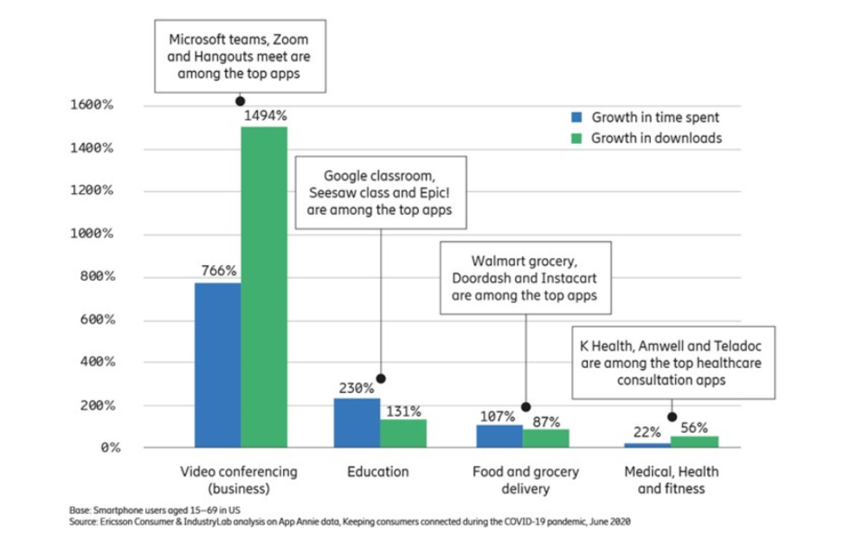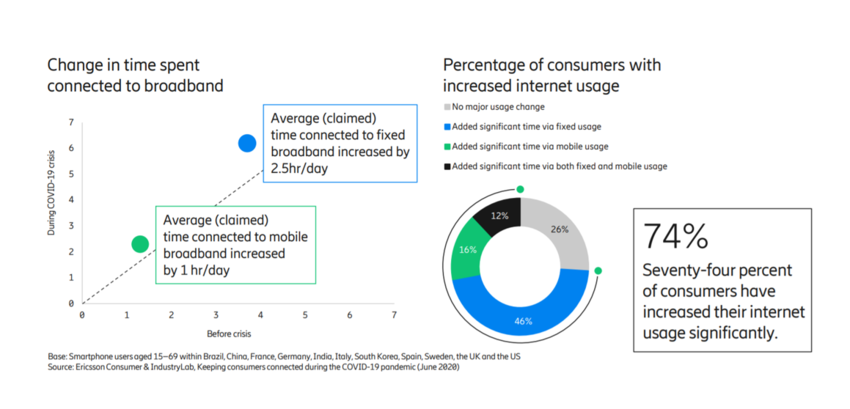What’s an ‘essential service’? Not knowing could block access to key digital services during COVID

- The supply of services was as disrupted as the supply of goods during the pandemic.
- A coordinated definition of ‘essential services’ could mitigate disruptions as the world tackles second and third waves of the coronavirus.
As the COVID-19 pandemic disrupted the supply of global goods, it also disrupted the supply of services. Varying definitions of “essential services” across countries created unintentional trade barriers as some exporting countries allowed for operations while other importing countries did not (and vice versa). A coordinated understanding of “essential services” (ensuring that, along with healthcare and civil services, each country counts IT and digital services as essential), could help alleviate disruptions in global supply of services, especially if the global economy faces “second” or “third” waves of the COVID virus in the months ahead.
Surges in demand for IT services and digitally-enabled services
The pandemic pushed the world to rely more heavily on digitally-enabled services to sustain social distance while keeping our societies connected and our economies running. The graph below shows the sharp increase in app usage in the US during the pandemic, with videoconferencing apps experiencing the highest growth.

Such increases were seen across a range of digital tools. For instance, this March, Facebook reported a 50% increase in the use of its online messaging service, with voice and video traffic doubling in countries hard hit by the pandemic. Some countries saw massive shifts, such as the 1,000% increase in time spent on Facebook group calls in Italy or the 828% increase in the number of Zoom users in Thailand.
With these changes came a surge in demand for IT services. In some surveys, 74% of consumers reported significant increases in Internet usage with jumps of an hour a day for mobile and 2.5 hours a day for fixed broadband.

Supplying IT services – and managing disruptions
As countries around the world began to implement their COVID-19 responses, the differences in how governments treated information technology goods and services became apparent.
In the United States, a broad definition of essential services included not only the manufacture of IT goods that enable work from home and telework solutions (such as laptops and cell phones), but also the delivery and servicing of those products for customers who needed to use them. This inclusiveness helped to reduce disruptions as millions of Americans began to work and learn from home.
Some countries’ policies included exemptions for the manufacture of IT goods, but not the delivery or servicing of them. For instance, if telecommunications were included among a country’s essential services, terminology made it unclear if that category included ICT services, or only Internet and phone services.
In some countries, Internet services, IT and some digital-enabled services were exempted from stay-at home orders. Yet, some IT services such as cloud service providers – quite global in nature given their business model – and IT infrastructure were subject to movement or lock-down restrictions. The BSA Software Alliance, including companies like Salesforce, Amazon Web Services and Microsoft to name a few, addressed letters to these governments asking for the inclusion of these services as “essential”. Cloud services, software and hardware platforms and other IT infrastructure services are key for the correct functioning of both services and goods supply chains.
Some of these letters also urged for the continuation of on-going construction and installation of new facilities – also to be considered “essential” as they make a difference in Internet congestion in times of unprecedented reliance on remote services. With much of the world’s population without good quality Internet, this remains one of the main barriers for access to telemedicine.
Moreover, some countries restricted goods imports to only essential products, but ICT products were not included among these essentials, making it difficult to provide needed inventory to banks, hospitals, schools, and businesses in need of IT systems to keep their operations running remotely.
Unintentionally, the disparity in the definition of “essential services” around the world affected not just trade, but also investment decisions. Narrower definitions in some developing countries made some headquarter companies question their reliance on offshoring and reconsider further AI utilization in BPO tasks. Some have started to hire for some functions, such as call centers, on their home soil. With global revenue in ITO and BPO offshoring activities around $92.5 billion USD in 2019, reshuffling of task allocation could significantly affect the employment and income streams of countries such as India and China that are leading the provision of offshore services globally.
What can be done to avoid disruptions in global supply of services?
If predictions for second and third waves are accurate, policy makers should use the coming weeks to critically evaluate which policies worked best to stem the spread of the disease while still allowing critical economic functions to continue.
Members of the services sector, including the Global Services Coalition, have already called for solutions to address the “uncoordinated patchwork of country lockdowns” to “avoid constricting the global supply of essential enabling services”. As GSC noted, ICT services must be available so that digital options can help governments and citizens work through any future quarantine restrictions.
While there are many policies that will need to be evaluated, the definition of what constitutes essential goods and services should be among the first discussed. A single, global definition of what falls in that category is unrealistic, and probably undesirable as countries at different levels of the health crisis would want to both protect their citizens while preserving economic activity when possible. Yet an explicit inclusion of ICT goods and also IT services should be at the top of the list to ensure the remote functioning of our economies and societies during the lockdown, where IT services are needed the most given their enabling function to consume so many other services, from teleconference to telemedicine.
Discussions on this topic – whether at the G20, OECD, the World Economic Forum through the COVID Action Platform or any other level – will be key to bringing a range of voices together to find long-lasting solutions. Such solutions won’t just help economies weather lockdown measures to come, they will ensure that countries are more resilient during future crises.
Source : World Economic Forum

